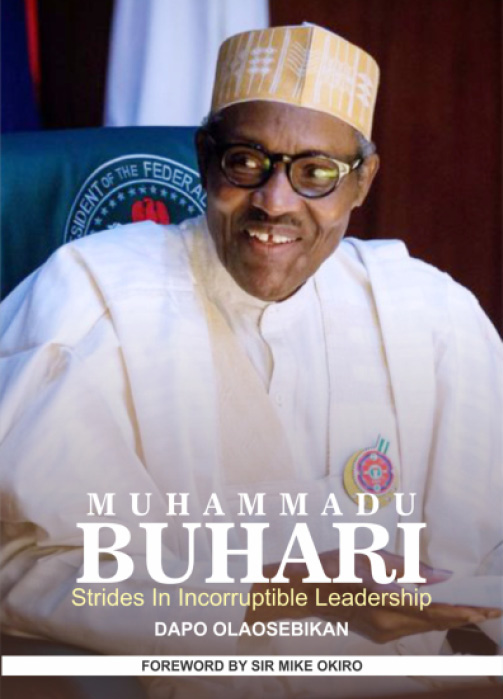An author reviews Buhari’s leadership style
Title: Muhammadu Buhari: Strides in Incorruptible Leadership Author: Dapo Olaosebikan Publisher: Double Golden Publishers Year: 2017 Pages: 450 Reviewer: Abdullateef Salau Corruption is endemic in Africa. Over the last 50 years, the continent is estimated to have lost in excess of $1 trillion in corruption and illicit financial flows (IFFs). This sum is roughly equivalent […]

Title: Muhammadu Buhari: Strides in Incorruptible Leadership
Author: Dapo Olaosebikan
Publisher: Double Golden Publishers
Year: 2017
Pages: 450
Reviewer: Abdullateef Salau
Corruption is endemic in Africa. Over the last 50 years, the continent is estimated to have lost in excess of $1 trillion in corruption and illicit financial flows (IFFs). This sum is roughly equivalent to all of the official development assistance received by Africa during the same timeframe.
Currently, Africa is estimated to be losing more than $50 billion annually in IFFs, according to the report of the AU High Level Panel on Illicit Financial Flows. These estimates may well be short of reality as accurate data does not exist for all transactions and for all African countries.
The report indicated that, two-thirds of IFFs were attributed to only two regions: West Africa (38 per cent) and North Africa (28 per cent). Each of the other three regions (Southern, Eastern and Central Africa) registered about 10 per cent of Africa’s total IFFs.
Nigeria accounts for the largest share of IFFs for West Africa (79 per cent of the West African total), whereas Egypt and Algeria account for 66 per cent of the IFFs from North Africa.
President Muhammadu Buhari, during his election campaign in 2015, vowed to fight corruption head-on if elected. Since his election, anti-graft war has remained one of his topmost priority.
In confirmation of his giant stride in the fight against corruption, the African Union at its 30th summit in Addis Ababa, Ethiopian capital appointed President Buhari as the union’s anti-corruption champion.
In ‘Muhammadu Buhari: Strides in Incorruptible Leadership’ the author establishes that every nation that has made it to the top in world geo-politics has been blessed with some game-changing, change-instituting and forthright leaders at one historical epoch or the other. He expatiates that in modern history, Chairman Mao Tse-Tung was a blessing to China in this regard; Mahatma Gandhi as India’s change talisman while in Singapore, it was Lee Kuan Yew that took the erstwhile rural economy to new heights.
He further explains that back home in Africa, beloved Nelson Mandela was the purveyor of change and advancement in South Africa, ever revered Julius Nyerere did it for Tanzania and in Ghana, Kwame Nkrumah was the visionary icon of the mission that Jerry J. Rawlings perfected with uncommon courage and patriotism.
The author concludes that Nigeria has got her visionary icons. Amongst them is Great Zik of Africa, Ahmadu Bello-the administrative genius, Obafemi Awolowo-the sage and an indisputable father of modern Nigeria and Michael Okpara, the governmental managerial titan.
He further elucidates in that there is no contesting the fact that while these esteemed Nigerian leaders were in control of governmental apparatus, our country flourished even without petrodollars and the denominating factor of their celebrated successes and the solid foundation they built for the nation remains unforgettable. This was as a result of their commitment to the goal of attaining ‘the greatest good of the greatest number’ with unequalled vision, incorruptibility, discipline and sacrifice. And that since they left the scene, Nigeria has floundered with undisciplined, self-serving and ultra-corrupt leadership, particularly since 1999.
The situation, according to the author, was quite caustic and the Nigerian populace was helpless. A part of Chapter Seven reads:
“Indeed, Buhari inherited a socio-economically raped nation and politically gang-banded country put on unbridled garage sale by a rapacious mob of political profiteers”.
The 450-page book contains eight chapters and is well produced in a clear and readable style. It is not another biography or a sort of hagiography of President Muhammadu Buhari. Rather, it’s a huge academic exercise undertaken (for two years) to re-write Nigerian socio-political history through the prisms of President Buhari’s visionary, disciplined, nationalistic and incorruptible leadership as a military Head of State and, particularly, as the democratically elected Nigerian President.
The book is an interesting read anywhere and any day for researchers and readers alike. It is research-based and has a huge theoretical superstructure and is not praise-singing President Buhari’s strides in life as a Nigerian and African leader, but is a critical appraisal of his leadership and its essence to the Nigerian nation.
Consciously and conscientiously, the author, Mr. Dapo Olaosebikan, does make the book a huge academic harvest of all relevant things that had ever been said or written about the enigmatic leadership style of President Buhari by both the pro and anti-Buhari forces.
‘Muhammadu Buhari: Strides in Incorruptible Leadership’ is a book on the political history of our nation. It is for current and future Nigerian leaders, students of History, Sociology and Political Science, particularly those who are (and will be) interested in President Muhammadu Buhari’s celebrated disciplined and incorruptible leadership and lifestyle.
All chapters are laced and referenced with indices of President Buhari’s celebrated incorruptibility and disciplined approach to life, leadership and governance and the huge lessons therein to be imbibed by present and future generations of Nigerians, leaders and followers, at all times.
